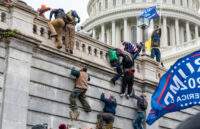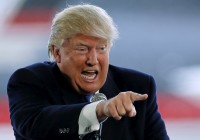The dissenting opinion of Associate Justice Sonia Sotomayor in the Trump immunity case, lightly edited for brevity, with emphasis added in bold.
Today’s decision to grant former Presidents criminal immunity reshapes the institution of the Presidency. It makes a mockery of the principle, foundational to our Constitution and system of Government, that no man is above the law.
Relying on little more than its own misguided wisdom about the need for “bold and unhesitating action” by the President … The Court gives former President Trump all the immunity he asked for and more. Because our Constitution does not shield a former President from answering for criminal and treasonous acts, I dissent.
The indictment paints a stark portrait of a President desperate to stay in power. … That is the backdrop against which this case comes to the Court.
The Court now confronts a question it has never had to answer in the Nation’s history: Whether a former President enjoys immunity from federal criminal prosecution. The majority thinks he should, and so it invents an atextual, ahistorical, and unjustifiable immunity that puts the President above the law.
Argument by argument, the majority invents immunity through brute force. Under scrutiny, its arguments crumble. … No matter how you look at it, the majority’s official-acts immunity is utterly indefensible.
Historical evidence reinforces that, from the very beginning, the presumption in this Nation has always been that no man is free to flout the criminal law. The majority fails to recognize or grapple with the lack of historical evidence for its new immunity. With nothing on its side of the ledger, the most the majority can do is claim that the historical evidence is a wash.
The majority today endorses an expansive vision of Presidential immunity that was never recognized by the Founders, any sitting President, the Executive Branch, or even President Trump’s lawyers, until now. Settled understandings of the Constitution are of little use to the majority in this case, and so it ignores them.
Today’s Court … has replaced a presumption of equality before the law with a presumption that the President is above the law for all of his official acts.
The majority’s dividing line between “official” and “unofficial” conduct narrows the conduct considered “unofficial” almost to a nullity. … Under that rule, any use of official power for any purpose, even the most corrupt purpose indicated by objective evidence of the most corrupt motives and intent, remains official and immune. Under the majority’s test, if it can be called a test, the category of Presidential action that can be deemed “unofficial” is destined to be vanishingly small.
I am deeply troubled by the idea, inherent in the majority’s opinion, that our Nation loses something valuable when the President is forced to operate within the confines of federal criminal law.
The public interest in the federal criminal prosecution of a former President alleged to have used the powers of his office to commit crimes may be greater still. “[T]he President … represent[s] all the voters in the Nation,” and his powers are given by the people under our Constitution. …
When Presidents use the powers of their office for personal gain or as part of a criminal scheme, every person in the country has an interest in that criminal prosecution. The majority overlooks that paramount interest entirely. … Yet the majority believes that a President’s anxiety over prosecution overrides the public’s interest in accountability and negates the interests of the other branches in carrying out their constitutionally assigned functions.
If the former President cannot be held criminally liable for his official acts, those acts should still be admissible to prove knowledge or intent in criminal prosecutions of unofficial acts. … Imagine a President states in an official speech that he intends to stop a political rival from passing legislation that he opposes, no matter what it takes to do so (official act). He then hires a private hitman to murder that political rival (unofficial act). Under the majority’s rule, the murder indictment could include no allegation of the President’s public admission of premeditated intent to support the mens rea of murder. That is a strange result, to say the least.
Today’s decision to grant former Presidents immunity for their official acts is deeply wrong. … In the hands of the majority, this new official-acts immunity operates as a one-way ratchet.
The long-term consequences of today’s decision are stark. The Court effectively creates a law-free zone around the President, upsetting the status quo that has existed since the Founding.
The President of the United States is the most powerful person in the country, and possibly the world. When he uses his official powers in any way, under the majority’s reasoning, he now will be insulated from criminal prosecution.
Orders the Navy’s Seal Team 6 to assassinate a political rival? Immune.
Organizes a military coup to hold onto power? Immune.
Takes a bribe in exchange for a pardon? Immune. Immune, immune, immune.
Let the President violate the law, let him exploit the trappings of his office for personal gain, let him use his official power for evil ends. Because if he knew that he may one day face liability for breaking the law, he might not be as bold and fearless as we would like him to be. That is the majority’s message today.
Even if these nightmare scenarios never play out, and I pray they never do, the damage has been done. The relationship between the President and the people he serves has shifted irrevocably. In every use of official power, the President is now a king above the law.
Never in the history of our Republic has a President had reason to believe that he would be immune from criminal prosecution if he used the trappings of his office to violate the criminal law. Moving forward, however, all former Presidents will be cloaked in such immunity. If the occupant of that office misuses official power for personal gain, the criminal law that the rest of us must abide will not provide a backstop. With fear for our democracy, I dissent.






Be First to Comment